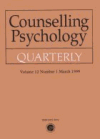
The relationship between progress feedback and therapeutic outcome in student counselling: A randomised control trial
Objective: Stimulated by findings that continuous feedback on client progress improves therapy outcomes (Lambert, Whipple, & Smart, 2001a, Patient-focused research: Using patient outcome data to enhance treatment effects. Journal of Consulting and Clinical Psychology,
69, 159–172) and by arguments that any instrument taking more than 5 min to implement is impractical, this study was a randomised controlled trial investigating the effects of session-by-session progress feedback using the ultra-brief Outcome Rating Scale. Method:
A between-subjects design was used. Participants (n = 110) were randomly assigned ‘feedback’ or ‘no feedback’ status, and attended one of eight therapists in a university counselling service. Results: The results showed that there was not
a significant difference between the feedback and no-feedback conditions. Both conditions improved therapeutically; however, the feedback condition had a greater effect size (0.85 vs. 0.64), suggesting that with a larger sample statistical significance may have been attained. Between the two
conditions there was not a significant difference found in participants classified as reliably changed, unchanged, or deteriorated. However, when the clients were divided into groups on the basis of their presenting issue, the clients with anxiety whose therapists used feedback had significantly
better outcomes at the end of therapy than the clients whose therapists did not receive the feedback. Conclusion: Contrary to previous studies, the feedback on the client's progression provided to the therapist had only a small effect on improving therapy outcome. The feedback, however,
improved outcomes of the clients presenting with anxiety.
Keywords: feedback; psychotherapy; randomized controlled trial; treatment effectiveness evaluation; treatment outcomes
Document Type: Research Article
Affiliations: Trinity College, Dublin, Ireland
Publication date: 01 March 2012
- Editorial Board
- Information for Authors
- Subscribe to this Title
- Ingenta Connect is not responsible for the content or availability of external websites
- Access Key
- Free content
- Partial Free content
- New content
- Open access content
- Partial Open access content
- Subscribed content
- Partial Subscribed content
- Free trial content